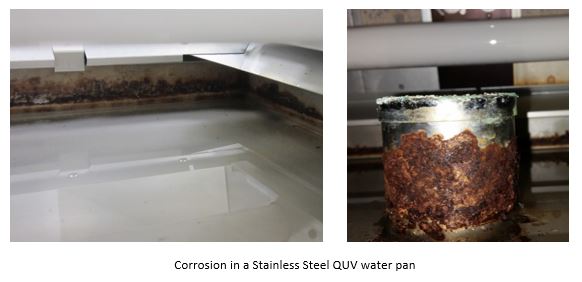Frequently Asked Questions
Cámara de envejecimiento artificial QUV
The water pan in a QUV tester is made from stainless steel, and in most cases does not experience corrosion. To deal with those rare cases where a QUV water pan does corrode, Q-Lab offers a “Super Alloy” QUV water pan that is more corrosion-resistant than stainless steel.
This Super Alloy water pan is not intended for cases where the observed corrosion or oxidation is actually only non-corrosion debris, as in the photo below. This buildup of precipitated minerals over time may occur when tap water is used in a QUV SE or Basic testers (DI water is required for Spray models). Although tap water is acceptable for use in a non-spray QUV, its use does requires more frequent cleaning of the water pan. If you see debris buildup like this in your QUV, you may have “hard water” and should consider the use of reverse osmosis/deinoized (RO/DI) purified water with your QUV.

However, in some cases, actual corrosion of the stainless steel water pan is observed, as in the photo below. Replacing your stainless steel QUV water pan with a Super Alloy water pan is appropriate to correct this problem. Furthermore, if corrosion like this is observed in one QUV, a Super Alloy water pan should be installed in all other QUV’s located in the same laboratory as the corroded QUV.

Ha iniciado su sesión en su cuenta. Ahora puede acceder libremente a todos los ( ) y (
) y ( ). Para acceder a los documentos (
). Para acceder a los documentos ( ), registre su equipo aquí.
Ha iniciado su sesión en su cuenta. Ahora puede acceder libremente a todos los (
), registre su equipo aquí.
Ha iniciado su sesión en su cuenta. Ahora puede acceder libremente a todos los ( ) y (
) y ( ). Para acceder a los documentos (
). Para acceder a los documentos ( ), registre su equipo aquí.
), registre su equipo aquí.